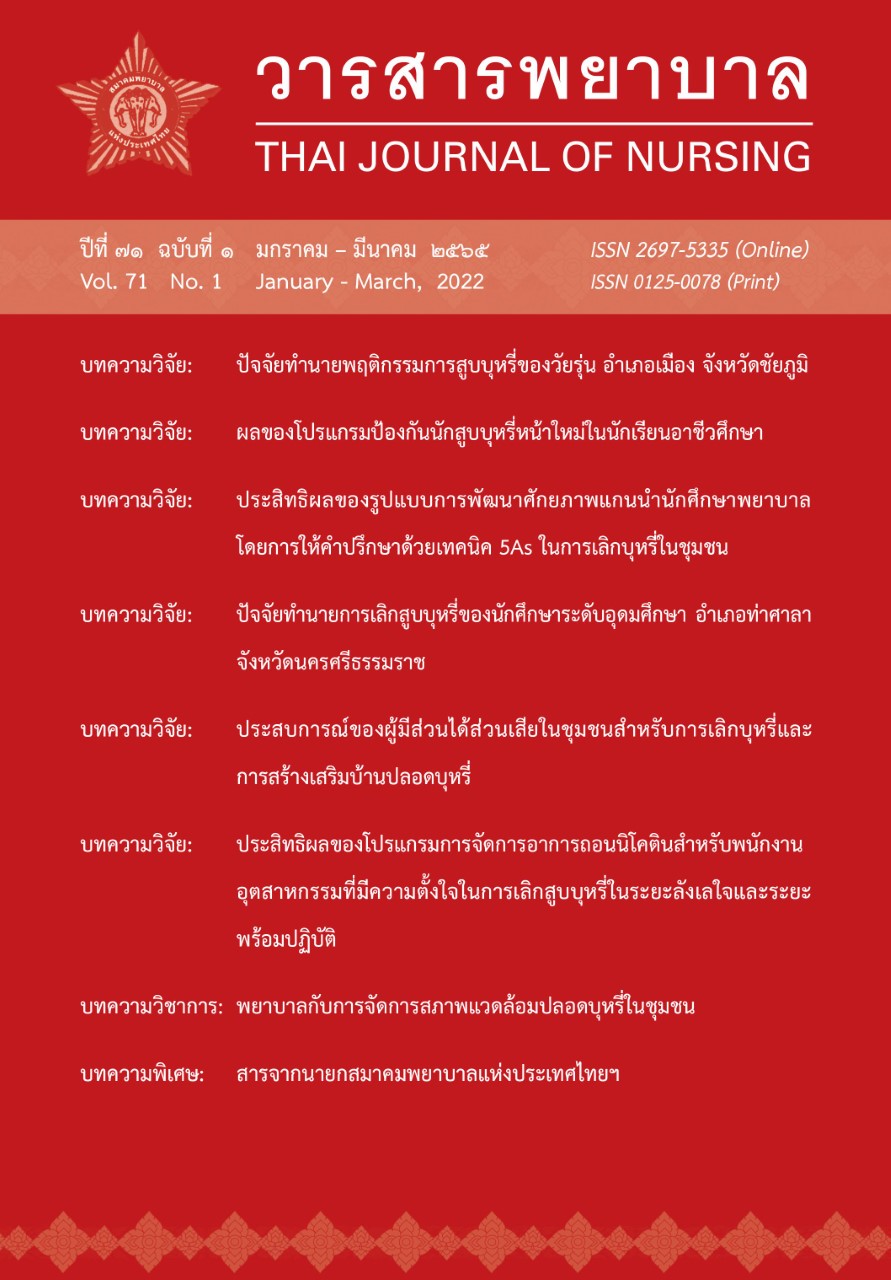Effectiveness of nicotine withdrawal symptom management program for industrial workers in contemplation and preparation stages of tobacco quitting process
Main Article Content
Abstract
The objective of this quasi–experimental study was to examine the effectiveness of the nicotine withdrawal symptom management program for industrial workers at contemplation and preparation stages of tobacco quitting process. Sixty participants were purposively selected from male workers at a factory in Bangkok Metropolitan. Simple random technique was employed to separate equally into the experimental group and the comparison group. The self-administered questionnaire was used to assess nicotine withdrawal symptoms, tobacco cravings and perceived capability to quit smoking. The program consists of 3-weeks activities and 1-week follow-up. Mann-Whitney U Test was employed for data analysis. Results revealed that after the implementation of the nicotine withdrawal symptom management program, industrial workers at contemplation and preparation stages of tobacco quitting process in the experimental group had nicotine withdrawal symptoms, tobacco craving, and perceived capability to quit smoking better than the comparison group at p < .01 after experiment and at follow-up stages.
Article Details

This work is licensed under a Creative Commons Attribution-NonCommercial-NoDerivatives 4.0 International License.
References
ชีวนันท์ เลิศพิริยสุวัฒน์, อริยะ บุญงามชัยรัตน์ และไผท จุนทะเกาศลย์. (บ.ก.). (2559). แผนยุทธศาสตร์การ
วิจัยและพัฒนาด้านการป้องกัน ควบคุมโรคและภัยสุขภาพของประเทศไทย พ.ศ. 2560 - 2564.
กรุงเทพมหานคร: นิวธรรมดาการพิมพ์.
นิยม จันทร์นวล, และศิริญญา วิลาศรี. (2560). ผลการประยุกต์ทฤษฎีการรับรู้ความสามารถตนเองในการ
ปรับเปลี่ยนพฤติกรรมการสูบบุหรี่ ของเจ้าหน้าที่ตำรวจ สถานีตำรวจภูธรเมืองชัยภูมิ. วารสารสุขภาพ
และการศึกษาพยาบาล, 23(1), 44-58.
ปรัชพร กลีบประทุม. (2559). ผลของโปรแกรมส่งเสริมการเลิกสูบบุหรี่สำหรับผู้สูบบุหรี่ในตำบลบางแก้ว
อำเภอเมืองอ่างทอง จังหวัดอ่างทอง (วิทยานิพนธ์ปริญญามหาบัณฑิต ไม่ได้ตีพิมพ์). มหาวิทยาลัย
มหิดล, กรุงเทพมหานคร.
พรรณี ปานเทวัญ. (2560). ทฤษฎีความสามารถของตนเองกับการเลิกสูบบุหรี. วารสารพยาบาลทหารบก, 18
(3), 35-43.
ศรัณยพิชญ์ ปาประลิต, สุรินธร กลัมพากร และจุฑาธิป ศีลบุตร. (2559). ผลของโปรแกรมการให้ความรู้เพื่อ
ช่วยเลิกบุหรี่แบบกระชับ ร่วมกับการใช้โทรศัพท์ติดตามผลการเลิกบุหรี่ของพนักงานอุตสาหกรรม
ผลิตภัณฑ์หลังคา จังหวัดสระบุรี. วารสารพยาบาล, 65(1), 28-38.
สุปาณี เสนาดิสัย, และสุรินธร กลัมพากร. (2555). บุหรี่กับสุขภาพ: พยาบาลกับการควบคุมการบริโภค
ยาสูบ. กรุงเทพมหานคร: เครือข่ายพยาบาลเพื่อการควบคุมยาสูบแห่งประเทศไทย.
อรอนงค์ ส่งทวน. (2552). ผลของการช่วยเหลือเพื่อเลิกบุหรี่ร่วมกับผ่อนคลายด้วยวิธีการหายใจแบบลึกต่อ
อาการขาดนิโคติน ความอยากบุหรี่และการกลับมาสูบบุหรี่ซ้ำในผู้ป่วยศัลยกรรม (วิทยานิพนธ์
ปริญญามหาบัณฑิต ไม่ได้ตีพิมพ์). จุฬาลงกรณ์มหาวิทยาลัย, กรุงเทพมหานคร.
เอมหทัย ศรีจันทร์หล้า. (2556). ผลของโปรแกรมการส่งเสริมการรับรู้สมรรถนะแห่งตนต่อพฤติกรรมการ
เลิกสูบบุหรี่ของผู้ป่วยจิตเภท(วิทยานิพนธ์ ปริญญามหาบัณฑิต ไม่ได้ตีพิมพ์). จุฬาลงกรณ์
มหาวิทยาลัย, กรุงเทพมหานคร.
Bandura, A. (1999). A social cognitive theory of personality. In Handbook of personality (2nd ed., pp
-196). New York: Guilford.
Clyde, M., Pipe, A., Reid, R., Els, C., & Tulloch, H. (2018). A bidirectional path analysis model of
smoking cessation self-efficacy and concurrent smoking status: Impact on abstinence outcomes.
Addiction Biology, 24(5), 1034-1043. doi: 10.1111/adb.12647
Haasova, M. (2014). The effects of physical activity on cigarette cravings (Unpublished doctoral
dissertation). University of Exeter, UK.
Piper, M. E. (2015). Withdrawal: Expanding a key addiction construct. Nicotine & Tobacco Research,
(12), 1405–1415. https://doi.org/10.1093/ntr/ntv048
Polit, D. F., & Beck, C. T. (2003). Nursing research: Principles and methods (7th.ed.). Philadelphia:
Lippincott Williams and Wilkins.
Prochaska, J. O., Velicer, W. F., DiClemente, C. C., & Fava, J. (1988). Measuring processes of change:
Applications to the cessation of smoking. Journal of Consulting and Clinical Psychology, 56(4),
-528. doi:10.1037/0022-006X.56.4.520


